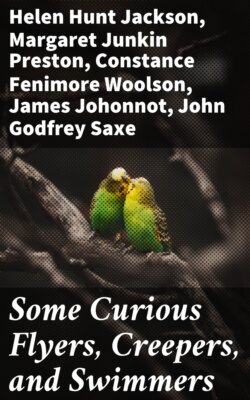Читать книгу Some Curious Flyers, Creepers, and Swimmers - Celia Thaxter - Страница 4
На сайте Литреса книга снята с продажи.
PREFACE.
ОглавлениеTable of Contents
The reasons why this book appears as appended to the series of the Natural History supplementary readers are as follows:
In preparing the third and fourth books of the series, much more matter accumulated than could be contained in the volumes of the size contemplated; and the only alternative was either to cut down the chapters by leaving out a large share of the story part, or to drop whole chapters, thus omitting the notice of many orders of animals, and marring the original plan of the work. After deliberation, the latter method was adopted, and reluctantly the four volumes were given to the public with important topics wholly omitted. The amount of this matter was so great that it was at length resolved to make this additional volume, so that our little friends at home and at school may have the story of animals and the simple outline of their description nearly complete.
These books do not aim to take the place of a scientific treatise upon natural history, but rather they are designed to serve as an introduction to the study of the subject by the way of observations made and interest excited. The method is the same as in the other volumes of the series; in each order of animals the study of home specimens precedes the foreign, and the study itself rises from the observation of facts in a single line of investigation to a perception of the relation of these facts to each other, and the wider relations which they sustain to other departments of thought.
We are not unmindful of the fact that reading-books are supposed to be specially prepared to teach reading; but we are also impressed with the more profound truth that reading implies thought, and hence that reading-lessons must be both intelligible and interesting.
For children, there seems to be a charm about stories of animals that awakens thought, and in their eagerness to give this thought expression they often leap over mere mechanical difficulties, and acquire skill with the ease and rapidity of intuition.
It can not be too strongly borne in mind that the reading of words without understanding the thought must be monotonous and vicious in style, and that all effort on the part of parent and teacher to correct such habits, while the causes continue, must prove abortive. The remedy will come from the use of matter which reaches the understanding and furnishes positive instruction.
